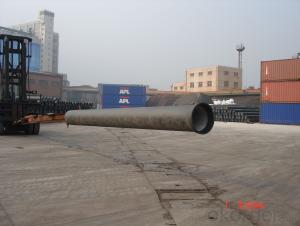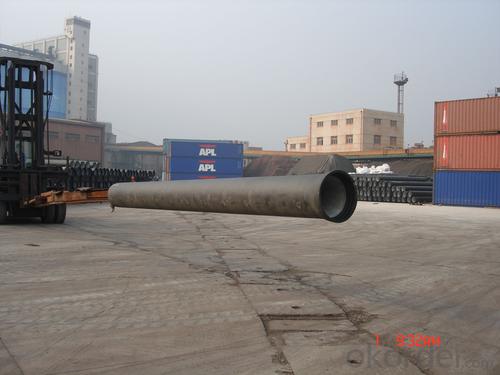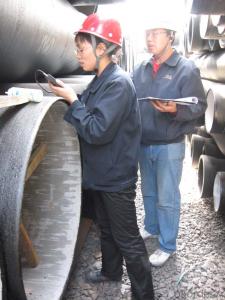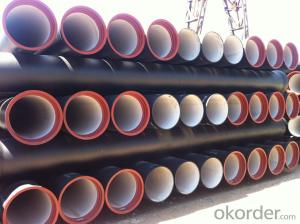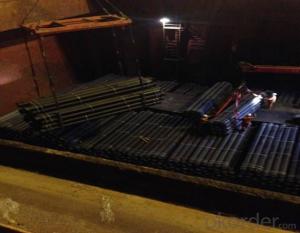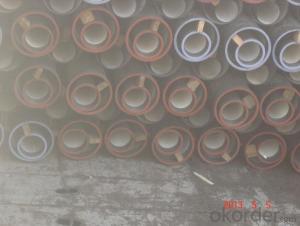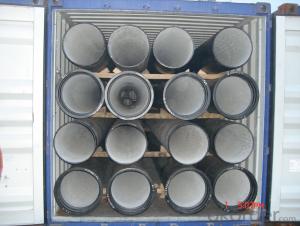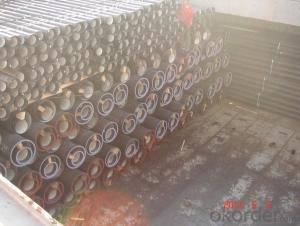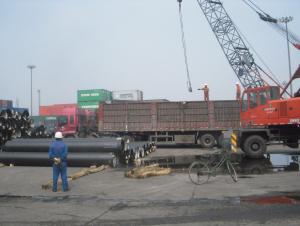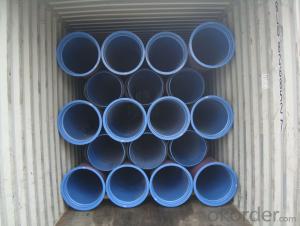DUCTILE IRON PIPES AND PIPE FITTINGS K8 CLASS DN200
- Loading Port:
- Tianjin
- Payment Terms:
- TT OR LC
- Min Order Qty:
- 22 pc
- Supply Capability:
- 3000 pc/month
OKorder Service Pledge
OKorder Financial Service
You Might Also Like
Material : Ductile Cast Iron
Size Range : DN 80mm to DN 2000mm
Unit Effective Length : 6m or 5.7m
Manufacture Standard: ISO 2531:1998/ EN 545:2006/EN 598:2007
Annual capacity : 200,000 tons
Coating Exterior: Zinc 130g/m2 according to ISO 8179-1 and bitumen coating 70 microns.
Cement Interior: Portland Cement/ High Alumina Cement/ Sulphate Resisting Cement Lining according to ISO 4179
Special requirements on external coating and internal lining can be applied
We also provide accessories such as SBR/EPDM rubber gaskets, lubricant paste, pipe caps, PE sleeves, etc.
Additional Parts:
Each pipe is strictly inspected according to related standard to ensure permanently high performance.
Easy Installation at site and service free for life
Long Service Lifespan
Quotation will arrive you within 24hours once we get your inquiry.
We guarantee offering you a competitive price.
A copy of original inspection reports of pipes will be offered after shipment.
Photos of loading process will be sent to the customer after shipment effect.
We will follow-up the delivery progress after shipment effect and update to the customer on weekly basis.
- Q: Can ductile iron pipes be used for trench crossings?
- Indeed, trench crossings can utilize ductile iron pipes. Renowned for their remarkable strength and durability, ductile iron pipes prove to be fitting for a diverse array of purposes, including trench crossings. Their capacity to endure substantial burdens and external pressures renders them an optimal selection for subterranean installations. Moreover, ductile iron pipes boast exceptional resistance to corrosion, guaranteeing their enduring and dependable performance in the context of trench crossings.
- Q: What are the different methods for testing ductile iron pipe?
- There are several methods for testing ductile iron pipe, including visual inspection, hydrostatic pressure testing, ultrasonic testing, magnetic particle inspection, and mechanical testing.
- Q: How do ductile iron pipes handle dynamic loads?
- Ductile iron pipes are known for their exceptional strength and durability, which allows them to effectively handle dynamic loads. These pipes have a high resistance to bending and can withstand the pressure and stress exerted on them when subjected to dynamic loads, such as water hammer or ground movement. The unique composition of ductile iron, which includes a small amount of carbon and the addition of magnesium, creates a structure that is both strong and flexible. This combination enables the pipes to flex under the impact of dynamic loads, rather than fracturing or breaking like other materials. Additionally, ductile iron pipes have a high impact resistance, which means they can absorb and distribute the energy generated by dynamic loads throughout their structure. This ability to dissipate energy helps to minimize the risk of pipe failure and ensures the longevity of the pipeline system. Furthermore, ductile iron pipes have excellent stress distribution properties, which means that the load applied to the pipes is evenly dispersed along their length. This helps to prevent localized stress concentrations and reduces the likelihood of damage or failure. In summary, ductile iron pipes are designed to handle dynamic loads efficiently. Their strength, flexibility, impact resistance, and stress distribution properties make them highly suitable for applications where dynamic loads are a concern, ensuring the reliability and longevity of the pipeline system.
- Q: How does ductile iron pipe perform in areas with high groundwater levels?
- Ductile iron pipe performs well in areas with high groundwater levels. Its durable and corrosion-resistant properties make it suitable for such environments. The pipe's strength and flexibility allow it to withstand the pressure exerted by the groundwater and adapt to any ground movement without compromising its structural integrity. Additionally, ductile iron pipe's protective linings further enhance its resistance to corrosion, ensuring long-term performance in high groundwater areas.
- Q: How are leaks repaired in ductile iron pipe?
- Leak repairs in ductile iron pipes are typically carried out using various methods depending on the severity and location of the leak. One commonly used technique is the application of epoxy-based sealants or leak repair clamps. For small leaks, epoxy sealants are commonly used. This involves applying a specialized epoxy compound to the leaking area, which then hardens and forms a durable seal over the leak. The epoxy is carefully applied to the surface of the pipe, covering the leakage point and any surrounding damaged areas. This method is effective for small leaks and can provide a long-lasting solution. In cases where the leak is larger or more severe, leak repair clamps are often employed. These clamps are designed to provide a mechanical seal over the leak, using rubber gaskets and bolts to secure the clamp tightly around the pipe. The pressure from the clamp compresses the gasket onto the pipe, creating a watertight seal and preventing further leakage. Leak repair clamps are available in various sizes to accommodate different pipe diameters. In both cases, it is crucial to properly prepare the pipe surface before applying the repair method. The area around the leak must be cleaned and dried thoroughly to ensure good adhesion of the epoxy or proper sealing with the clamp. Additionally, it is essential to follow the manufacturer's instructions and guidelines for the chosen repair method to ensure a successful and long-lasting repair. It is important to note that these repair methods are temporary solutions and may not be suitable for all situations. In some cases, particularly for extensive pipe damage or aging infrastructure, it may be necessary to replace the affected pipe section entirely. Professional assessment and guidance from qualified technicians or plumbers are recommended when dealing with leaks in ductile iron pipes to ensure proper repairs and minimize the risk of future issues.
- Q: Can the sealing ring of ductile iron pipe be reused?
- It is better not to have used things, easy aging, sealed, the best to use new
- Q: What is the content of silicon in silicon molybdenum ductile iron?
- Silicon molybdenum material, similar to the United States IDM5381, 5402 and other brands, engaged in automotive components (such as turbocharger parts), and other heat resistant parts have been exposed to high temperature
- Q: How does ductile iron pipe perform in areas with high soil compaction?
- Areas with high soil compaction benefit greatly from the exceptional performance of ductile iron pipe. One of its key advantages lies in its high strength and durability, enabling it to withstand heavy loads and pressures. In regions where soil compaction is prevalent, leading to ground movement and settling, ductile iron pipe's superior structural integrity guarantees its intactness and effective handling of stress. Moreover, ductile iron pipe exhibits excellent resistance to corrosion, which is especially crucial in areas with high soil compaction. The compacted soil often contains elevated levels of moisture or chemicals that may accelerate the corrosion process. Ductile iron's inherent resistance to corrosion ensures the pipe maintains its integrity over time, even in challenging soil conditions. Flexibility is another advantage of ductile iron pipe. This material possesses a high degree of flexibility, enabling it to absorb and distribute external loads more efficiently. In areas with high soil compaction, where the ground may shift or settle, ductile iron's flexibility minimizes the risk of pipe failure or damage. Additionally, ductile iron pipe boasts a smooth interior surface, enhancing its hydraulic performance. In regions with high soil compaction, where space for proper compaction around the pipe may be limited, the smooth interior reduces the likelihood of sediment buildup or clogging, ensuring efficient water flow. Overall, ductile iron pipe proves to be an excellent solution for areas with high soil compaction. Its strength, corrosion resistance, flexibility, and hydraulic performance establish it as a reliable and durable choice capable of withstanding the challenges presented by compacted soils.
- Q: Can ductile iron pipe be used in corrosive environments?
- Yes, ductile iron pipe can be used in corrosive environments. Ductile iron is known for its excellent corrosion resistance due to its protective oxide layer, making it suitable for various corrosive applications such as wastewater, chemical plants, and underground installations.
- Q: Are ductile iron pipes suitable for water distribution networks?
- Yes, ductile iron pipes are highly suitable for water distribution networks. They possess excellent strength, durability, and corrosion resistance, making them ideal for carrying and delivering water over long distances. Additionally, their flexibility allows for easy installation and adaptability to various terrains, ensuring reliable and efficient water distribution.
Send your message to us
DUCTILE IRON PIPES AND PIPE FITTINGS K8 CLASS DN200
- Loading Port:
- Tianjin
- Payment Terms:
- TT OR LC
- Min Order Qty:
- 22 pc
- Supply Capability:
- 3000 pc/month
OKorder Service Pledge
OKorder Financial Service
Similar products
Hot products
Hot Searches
Related keywords
